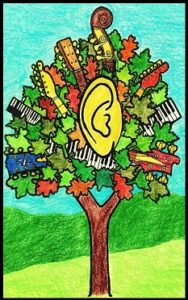 Classical music today remains as vital and dynamic as classical Latin. Non plaudite, modo pecuniam jacite!**
Classical music today remains as vital and dynamic as classical Latin. Non plaudite, modo pecuniam jacite!**
Albinoni’s “Adagio in G Minor” was written in 1708, but only discovered after WWII. The next major discovery, in some museum archive or burned-out attic, of unknown works by Bach, Beethoven or Brahms could happen any time. Set your news alerts!
Do a web search on a neutral phrase like, “the state of classical music today,” and you get a lot of results like, “Classical Music – Still Circling the Drain,” and “Seven Reasons No One Likes Classical Music Anymore.” Today, “classical” is a niche genre that owes its commercial existence to a modern distribution infrastructure built on the sales of rock, country, and pop music. Classical Music Rising paints a fairly rosy picture for classical music radio, but the New York Times says that classical accounts for something like 1% of music streaming.
So how has the “classical school” painted itself into a corner where they’re reduced to gaining new adherents by citing studies about the cognitive benefits of classical music for kids? (And I suppose rock-and-roll is linked to increased risk for spongiform encephalopathy.) Why are they selling classical music with benefit statements, like a patent medicine? How have they turned the buying public against some of humankind’s greatest cultural achievements?
Part of the answer has to do with outmoded attitudes, materials and methods. The fact is many musicians discover classical music through their adventures in popular music. It isn’t just classical musicians who defect to rock. Rockers also defect to
classical. The classical school needs to adopt the same lax attitude about dual-citizenship as modern musicians have toward classical musicians, but the “classical school” isn’t having it.
No one is still openly pushing ideas about the moral superiority of classical music that were common in the 19th century, but that attitude hasn’t gone away. In many classical circles, playing rock or jazz is still a taint.
However, for modern musicians, classical music is one style among many. As the sole arbiter of what is right and what is
wrong, the “classical school” has had its run, and it has had its say. For students of modern music, the whole classical mindset is an anachronism. In the age of apps and learning theory, classical music teachers too often appear as musical equivalents of the Amish, content to follow their own traditions, using tools and methods handed down from generations past, and ever skeptical of modernity.
In some ways, the psychological inflexibility of the “classical school” makes sense. They have the task of preserving a dead art form, dead in the respect that its repertoire is fixed and no longer growing. (This is not to discount new music composed in classical styles, 20th and 21st century orchestral music, new interpretations of classical works, etc.)
Teaching to the established creative practices of modern musicians is probably the best hope for producing a generation of students who are prepared to take on the rigors of classical music programs at a high school or college level. Many people have posed the idea that a more holistic music education might advance the worthy cause of preserving classical music and its traditions into the future.
Classical music today is in trouble. A lot of that trouble has to do with funding for orchestras and concert halls, but it goes beyond that. Why do Symphony orchestras have to round out their seasons with laser-light tributes to Led Zeppelin and Bad Company?
In the 1960s and 1970s, Dallas schools sent nearly every one of their students, at all grade levels, to see the Dallas Symphony Orchestra once every year. They stopped traffic for the fleets of school buses. The kids loved it, even if they didn’t all go on to attend concerts and support the symphony. It generated a lot of good will toward the DSO, and a generation of Dallas kids learned how to act in a concert hall. Then came the budget-cuts to arts and music programs. If only cities and towns across the country still did that sort of thing, maybe today’s symphonies wouldn’t be debating whether to allow flip flops, beer helmets and banners into their performances just to get people to buy tickets.
There’s a real disconnect between classical and modern musicians. More about that later.
© 2019, 2020 Greg Varhaug
(**Latin translation: “Don’t clap, just throw money!“)